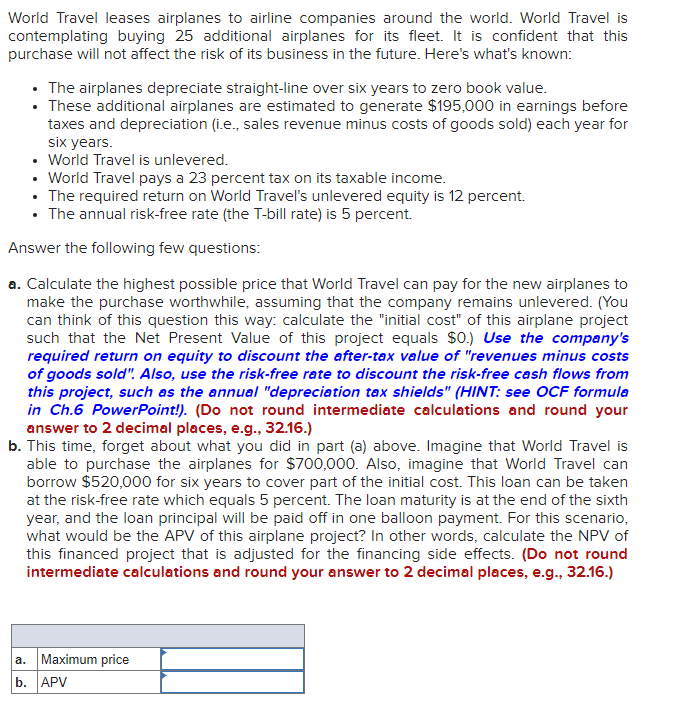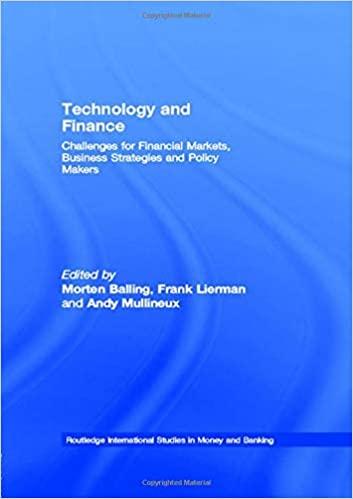
World Travel leases airplanes to airline companies around the world. World Travel is contemplating buying 25 additional airplanes for its fleet. It is confident that this purchase will not affect the risk of its business in the future. Here's what's known: The airplanes depreciate straight-line over six years to zero book value. These additional airplanes are estimated to generate $195,000 in earnings before taxes and depreciation (i.e., sales revenue minus costs of goods sold) each year for six years. World Travel is unlevered. World Travel pays a 23 percent tax on its taxable income. The required return on World Travel's unlevered equity is 12 percent. The annual risk-free rate (the T-bill rate) is 5 percent. Answer the following few questions: a. Calculate the highest possible price that World Travel can pay for the new airplanes to make the purchase worthwhile, assuming that the company remains unlevered. (You can think of this question this way: calculate the "initial cost" of this airplane project such that the Net Present Value of this project equals $0.) Use the company's required return on equity to discount the after-tax value of "revenues minus costs of goods sold". Also, use the risk-free rate to discount the risk-free cash flows from this project, such as the annual "depreciation tax shields" (HINT: see OCF formula in Ch.6 PowerPoint!). (Do not round intermediate calculations and round your answer to 2 decimal places, e.g., 32.16.) b. This time, forget about what you did in part (a) above. Imagine that World Travel is able to purchase the airplanes for $700,000. Also, imagine that World Travel can borrow $520,000 for six years to cover part of the initial cost. This loan can be taken at the risk-free rate which equals 5 percent. The loan maturity is at the end of the sixth year, and the loan principal will be paid off in one balloon payment. For this scenario, what would be the APV of this airplane project? In other words, calculate the NPV of this financed project that is adjusted for the financing side effects. (Do not round intermediate calculations and round your answer to 2 decimal places, e.g., 32.16.) a. Maximum price b. APV World Travel leases airplanes to airline companies around the world. World Travel is contemplating buying 25 additional airplanes for its fleet. It is confident that this purchase will not affect the risk of its business in the future. Here's what's known: The airplanes depreciate straight-line over six years to zero book value. These additional airplanes are estimated to generate $195,000 in earnings before taxes and depreciation (i.e., sales revenue minus costs of goods sold) each year for six years. World Travel is unlevered. World Travel pays a 23 percent tax on its taxable income. The required return on World Travel's unlevered equity is 12 percent. The annual risk-free rate (the T-bill rate) is 5 percent. Answer the following few questions: a. Calculate the highest possible price that World Travel can pay for the new airplanes to make the purchase worthwhile, assuming that the company remains unlevered. (You can think of this question this way: calculate the "initial cost" of this airplane project such that the Net Present Value of this project equals $0.) Use the company's required return on equity to discount the after-tax value of "revenues minus costs of goods sold". Also, use the risk-free rate to discount the risk-free cash flows from this project, such as the annual "depreciation tax shields" (HINT: see OCF formula in Ch.6 PowerPoint!). (Do not round intermediate calculations and round your answer to 2 decimal places, e.g., 32.16.) b. This time, forget about what you did in part (a) above. Imagine that World Travel is able to purchase the airplanes for $700,000. Also, imagine that World Travel can borrow $520,000 for six years to cover part of the initial cost. This loan can be taken at the risk-free rate which equals 5 percent. The loan maturity is at the end of the sixth year, and the loan principal will be paid off in one balloon payment. For this scenario, what would be the APV of this airplane project? In other words, calculate the NPV of this financed project that is adjusted for the financing side effects. (Do not round intermediate calculations and round your answer to 2 decimal places, e.g., 32.16.) a. Maximum price b. APV







